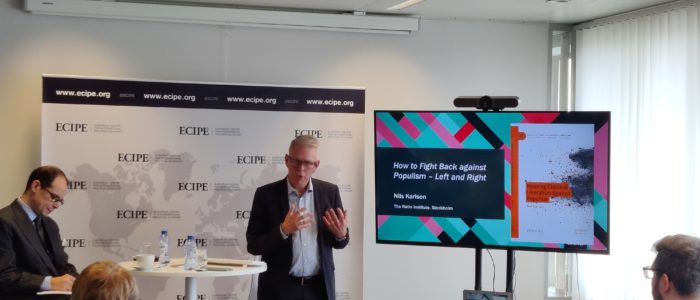Published
Seminar Summary: Liberalism versus Populism – How can Liberalism Fight Back?
By: Fredrik Erixon Guifré Margarit i Contel
Subjects: Uncategorised

On Thursday, 7 March 2024, at the ECIPE office in Brussels, we organised the event titled ” Liberalism versus Populism – How can Liberalism Fight Back?” where we examined the rise of populism in contrast to classical liberalism. Hosted by ECIPE director and founder Fredrik Erixon and featuring former political science professor and founder of the Ratio Institute Nils Karlson, the discussion delved into the complexities of populism, its impact on society, and the strategies to combat the populist wave by using the principles of classical liberalism.
Nils Karlson initiated the conversation by discussing his book, Reviving Classical Liberalism Against Populism. He underscored the global reach of populism, not limited to a specific ideology but incompatible with classical liberalism. Karlson attributes the rise of populism to simplistic solutions to complex problems and a rhetoric that divides society into ‘us versus them’. He stresses that populism often leads to autocratic tendencies, undermining democracy and individual freedoms.
Professor Karlson provided a historical overview, reminiscing about the era when liberal democracy seemed ascendant, only to be challenged by increasing polarisation and the decline of democracy worldwide. He pointed to the pandemic and the resurgence of autocracies as signs of these challenges. The heart of his argument lies in the unique characteristics of populism: unserious and ill-founded policies, divisive rhetoric and discourse frame, and a disregard for the principles of liberalism with an autocratic institutional orientation.
“The level of democracy today is down to the level of 1986, before the fall of the Berlin Wall. And the number of autocracies is increasing. Even within democracies, they are autocratising. They’re becoming more autocratic, limiting the rule of law, limiting individual liberties, rights of minorities, freedom of the press, and so on.”
Professor Nils Karlson on the current trend of political governance and democracies all over the world.
After the initial presentation, Mr. Erixon and Mr. Karlson engaged in a dialogue digging deeper into the essence of the liberal spirit, juxtaposing it against the populist approach which absolves individuals from responsibility while promising cost-free solutions. Karlson emphasizes the need for a liberal response that focuses on enhancing the institutions that uphold democracy and the rule of law, and on cultivating a liberal spirit that cherishes individual agency and communal engagement.
“Liberalism is not only about markets, it’s not only about institutions, it’s not only about property rights, liberal democracy and all this. It’s also about, you know, the kind of life we can live in these open societies. Pluralistic promotion of self-authorship. We can create meaning ourselves within families, and within communities.”
Professor Nils Karlson on the nature of the liberal spirit.
Karlson’s perspective is that the liberal response to populism must be multifaceted: exposing the divisive tactics of populists, defending and developing liberal institutions, and promoting the virtues of a liberal society that fosters human flourishing. This approach, according to him, requires a concerted effort from both political leaders and society at large to reimagine and reinforce the foundations of liberal democracy.
The dialogue further explored how liberalism can adapt and respond to the challenges posed by populism, emphasising the importance of ongoing reform and the defence of liberal values. Karlson argues for a revival of classical liberalism, not as a nostalgic return to the past, but as a forward-looking endeavour that adapts liberal principles to contemporary challenges.
In conclusion, the event provided a detailed exploration of the ideological battle between liberalism and populism while also offering a call to action for liberals to actively engage in the defence and promotion of liberal democracy. Karlson’s insights underlined the need for a liberal spirit that is inclusive, adaptable, and capable of addressing the economic, social, and political challenges of the 21st century. Through Professor Karlson’s comprehensive analysis, the event highlighted the enduring relevance of liberal values in an era marked by populism and division, offering a roadmap for reinvigorating liberal institutions and ideals.
You can listen to the event in podcast format by clicking the button below:
You can download Professor Nils Karlson’s full presentation by clicking the button below:
You can download Professor Nils Karlson’s full book by clicking the button below: